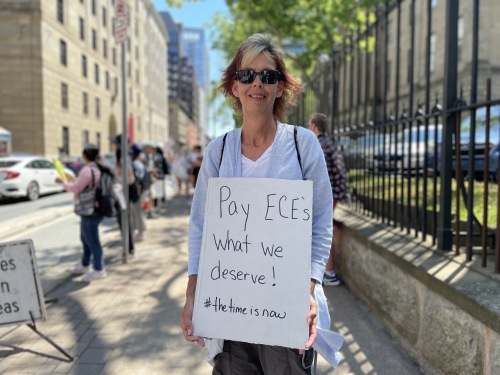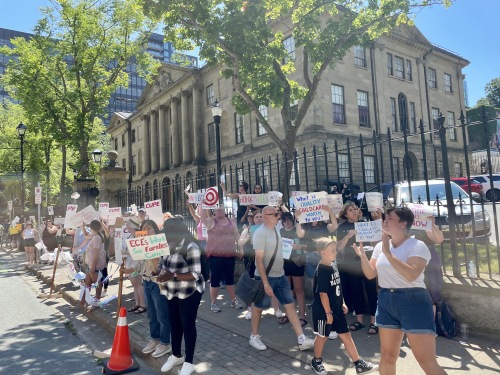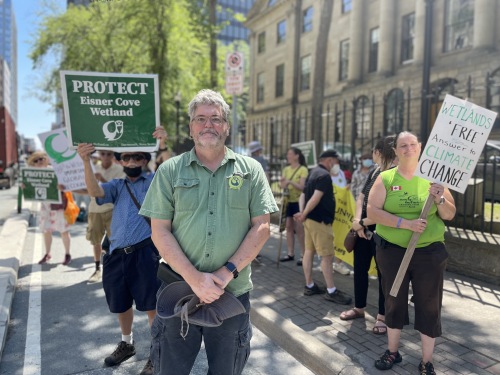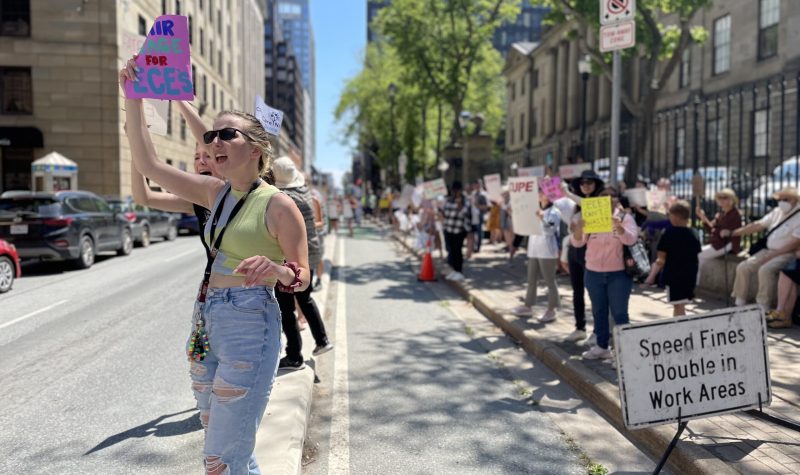Two rallies organized by Child Care Now Nova Scotia and by the environmental group Protect Our Southdale Wetland Society, took place in front of the Nova Scotia Legislature in Halifax on Tuesday at 1:30 p.m. The protests took place during the province's meeting to stop the implementation of a pay bump for its members that would raise annual salaries above $100,000.
First, CKDU inteviewed Bobbi-Lynn Keating, the director of Peter Green Hall Children's Center who has been an Early Childhood Educator (ECE) for 33 years, to discuss ECEs job conditions and salaries, which Keating says is much lower in comparison to other professions.
Eisner Cove Wetland is one of the last large untouched wetland areas in the HRM urban core and is home to many species of plants, animals and birds Bill Zebedee, president of Protect Our Southdale Wetland Society, said a development company wants to remove about 80 acres of wood for their housing project.
The protests took place during the province's meeting to stop the implementation of a pay bump for its members that would raise annual salaries above $100,000. The rally group by Child Care Now Nova Scotia is protesting the state of the province’s child care workforce.

Bobbi-Lynn Keating, the director of Peter Green Hall Children's Center and has been an Early Childhood Educator (ECE) for 33 years. She said the rally taking place is a culmination of three decades of work where ECEs have been underpaid. Photo by Sara Gouda.
Bobbi-Lynn Keating, the director of Peter Green Hall Children's Center has been an Early Childhood Educator (ECE) for 33 years. She said the rally taking place is a culmination of three decades of work where ECEs have been underpaid.
"Childcare has always been done on the backs of early childhood educators, and they get paid nothing. You can't raise a family, rent an apartment, own a car and eat on $15 an hour. It's unacceptable."
Keating said that the government offered a compensation package to lower parent fees and raise ECEs' wages and benefits, paid sick leave, and provide the required coverage.
"The legislature had an emergency sitting and we wanted to be here to make sure that our voices were heard."

People gathered at the legislature to raise awareness of Early Childhood Educator's conditions and pay. Photo by Sara Gouda.
Keating joined the protest today to raise awareness of early childhood educator's conditions, saying their employers do not have to provide them with vacation time or sick leave. She said this led to many people not being able to get paid during the pandemic if they were not able to work.
In order to work in early childhood, most Early Childhood Education programs across the province of Nova Scotia are delivered over two years.
In her 30-year career, Keating said although they are underpaid, she noticed a bump in pay in 1991 and early 2000s and hopes these rallies provide a similar solution.
"Without childcare centers, you won't have nurses, doctors, lawyers, or grocery store clerks. We are the backbone of the economy and all the other sectors need access to quality childcare."
The other protest taking place simultaneously were environmental groups raising concerns regarding on governmental decisions regarding the environment, in particular the Eisner Cove Wetland.

Eisner Cove Wetland is one of the last large untouched wetland areas in the HRM. Bill Zebedee, president of Protect Our Southdale Wetland Society, said a development company wants to remove about 80 acres of wood for their housing project. Photo by Sara Gouda.
Eisner Cove Wetland is one of the last large untouched wetland areas in the HRM urban core and is home to many species of plants, animals and birds.
Bill Zebedee, president of Protect Our Southdale Wetland Society, said a development company wants to take down about 80 acres of wood for their housing project.
"There's a proposal called the Southdale Future Growth Node by Clayton developments, they want to remove probably close to 80 acres of woods to build houses and it's the wrong place to do it. There are many other empty spaces in Dartmouth where you wouldn't have to remove any trees. "
Zebedee said environmentalists are concerned that removing a large number of trees would disturb the carbon stored in the wetland.
"Because of the trees being removed, we're already seeing what's called siltation, which is groundwater mixing with soft dirt and it's flowing downhill and will eventually get into the wetland."
Since January, Zebedee has fought and won three other development project proposals deemed inadequate for the environment. One of the biggest issues Zebedee and his society are facing is the decision on where houses can be developed, a right he said people in the HRM should have a vote on.
"The Minister of Housing announced in March that the Housing Task Force, [consisting] of five unelected people is making decisions on where housing is going to go. By doing that, the Minister took away our democratic right to have our voices heard."
He described the responses from the minister as "cookie cutter responses" and is calling on Haligonians to contact the MLA regarding environmental issues. People can also learn more information on the Eisner Cove Wetlands from their website.
Listen to the full interview below:


